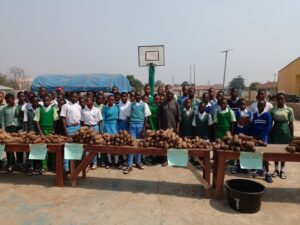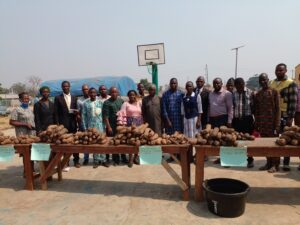Yam serves as a major food source and cash crop, combating malnutrition, food insecurity, and poverty, while also holding significant cultural, social, and religious value in West Africa, particularly in Nigeria.
According to the 2018 Food and Agricultural Organization (FAO) of the United Nations report, global yam production reached approximately 72.6 million tons, with Africa contributing 97.1%. Notably, Nigeria, Ghana, and Côte d’Ivoire were the top producers, accounting for 67.4%, 11.1%, and 10.3% of production, respectively (FAOSTAT, 2020).
However, Nigeria’s leading role in global yam production is threatened by banditry, which has deterred farmers from cultivating distant farmlands. This insecurity has worsened the longstanding challenges of yam theft and scarcity of seed yam planting materials.
To address the decline in yam production in Ondo State and Nigeria, the Dolapo-Frank Farmers Organization, a registered Nigerian Non-Governmental Organization (NGO), launched a yam revolution advocacy through its urban farming initiative. This initiative aims to encourage households to produce yams on a small scale for their own consumption. Farmers are empowered to produce organic yams using organic manure. The effectiveness of this approach was demonstrated through partnerships with selected secondary schools in Akure South Local Government, yielding significant successes.
Omooluorogbo Grammar School in Akure and Akure Secondary Commercial School in Ondo State, Nigeria, will serve as exemplary cases. Impressive ware yam tubers weighing over 3.5 kg were harvested at Omooluorogbo Grammar School in Akure, Ondo State, Nigeria, in October 2024. These tubers were produced from seed yams weighing between 350 g and 500 g, which were produced in the previous year, 2023. The success story of harvesting large yam tubers from soil-filled sacks confirms the feasibility of cultivating yams in backyard spaces and other nearby locations.* *This approach can protect smallholder farmers engaged in urban farming from the risks associated with distant farm locations vulnerable to banditry. Additionally, using soil-filled sacks can mitigate pilfering, a significant challenge to profitable yam farming.

The NGO Principal Consultant, Prof. F.O. Adekayode with students proudly displaying their harvested seed and ware yam tubers in Akure, Nigeria.

Agric. Teachers standing behind harvested yam tubers from their schools in Akure, Nigeria.